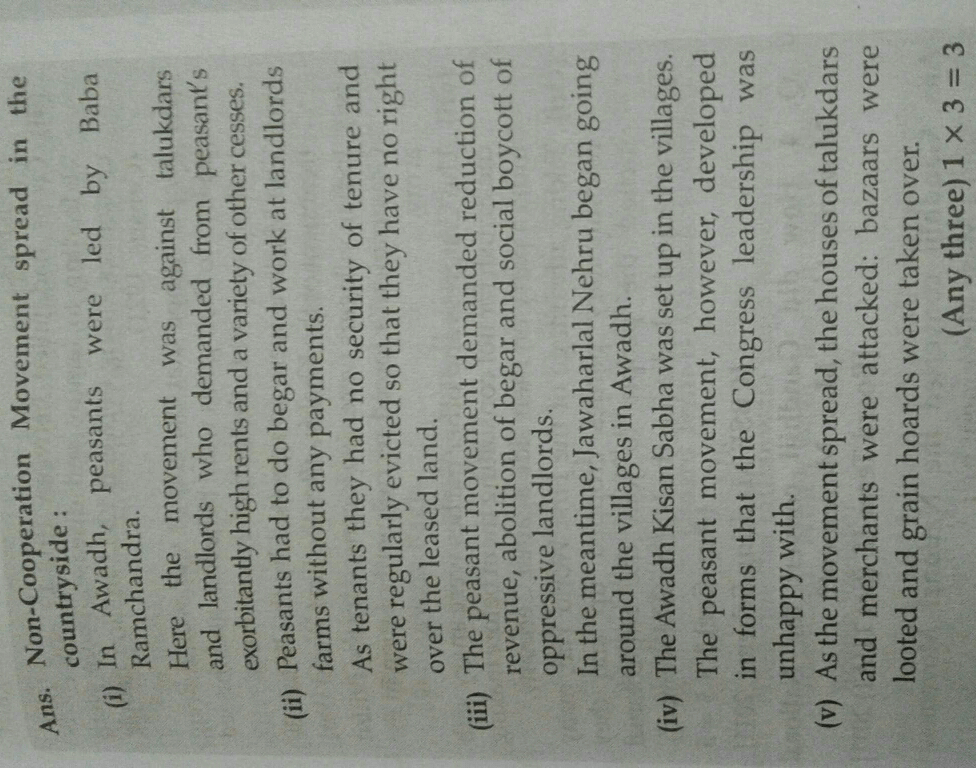Class 10 Exam > Class 10 Questions > Describe the spread of non coopreation moveme...
Start Learning for Free
Describe the spread of non coopreation movement in the countryside?
Most Upvoted Answer
Describe the spread of non coopreation movement in the countryside?

Community Answer
Describe the spread of non coopreation movement in the countryside?
Spread of Non Cooperation Movement in the Countryside
Rationale behind the Movement
The Non Cooperation Movement was launched by Mahatma Gandhi in 1920 as a response to the Rowlatt Act and the Jallianwala Bagh massacre. The movement aimed to boycott British goods, courts, and schools as a means of nonviolent protest against British rule.
Spread of the Movement
The Non Cooperation Movement gained widespread support in the countryside, particularly among farmers and peasants. This was because they had been hit the hardest by British policies such as high taxes, forced labor, and the introduction of cash crops.
Methods of Non Cooperation
The movement used several methods to encourage non cooperation with British authorities. These included:
- Boycotting British goods and using only Indian-made products
- Refusing to pay taxes or participate in government-run programs
- Withdrawing children from British-run schools and starting their own schools
- Organizing protests and strikes against British authorities
Impact of the Movement
The Non Cooperation Movement had a significant impact on the Indian independence struggle. It mobilized millions of people across the country and demonstrated the power of nonviolent resistance. It also forced the British government to take notice of Indian demands and led to the Round Table Conferences in London.
Conclusion
In conclusion, the Non Cooperation Movement was a crucial phase in India's struggle for independence. It galvanized the rural population and showed that nonviolent resistance could be an effective means of protest against British rule. Its impact can still be felt today, as India continues to uphold the values of nonviolence and civil disobedience.
Attention Class 10 Students!
To make sure you are not studying endlessly, EduRev has designed Class 10 study material, with Structured Courses, Videos, & Test Series. Plus get personalized analysis, doubt solving and improvement plans to achieve a great score in Class 10.

|
Explore Courses for Class 10 exam
|

|
Similar Class 10 Doubts
Describe the spread of non coopreation movement in the countryside?
Question Description
Describe the spread of non coopreation movement in the countryside? for Class 10 2024 is part of Class 10 preparation. The Question and answers have been prepared according to the Class 10 exam syllabus. Information about Describe the spread of non coopreation movement in the countryside? covers all topics & solutions for Class 10 2024 Exam. Find important definitions, questions, meanings, examples, exercises and tests below for Describe the spread of non coopreation movement in the countryside?.
Describe the spread of non coopreation movement in the countryside? for Class 10 2024 is part of Class 10 preparation. The Question and answers have been prepared according to the Class 10 exam syllabus. Information about Describe the spread of non coopreation movement in the countryside? covers all topics & solutions for Class 10 2024 Exam. Find important definitions, questions, meanings, examples, exercises and tests below for Describe the spread of non coopreation movement in the countryside?.
Solutions for Describe the spread of non coopreation movement in the countryside? in English & in Hindi are available as part of our courses for Class 10.
Download more important topics, notes, lectures and mock test series for Class 10 Exam by signing up for free.
Here you can find the meaning of Describe the spread of non coopreation movement in the countryside? defined & explained in the simplest way possible. Besides giving the explanation of
Describe the spread of non coopreation movement in the countryside?, a detailed solution for Describe the spread of non coopreation movement in the countryside? has been provided alongside types of Describe the spread of non coopreation movement in the countryside? theory, EduRev gives you an
ample number of questions to practice Describe the spread of non coopreation movement in the countryside? tests, examples and also practice Class 10 tests.

|
Explore Courses for Class 10 exam
|

|
Suggested Free Tests
Signup for Free!
Signup to see your scores go up within 7 days! Learn & Practice with 1000+ FREE Notes, Videos & Tests.

























